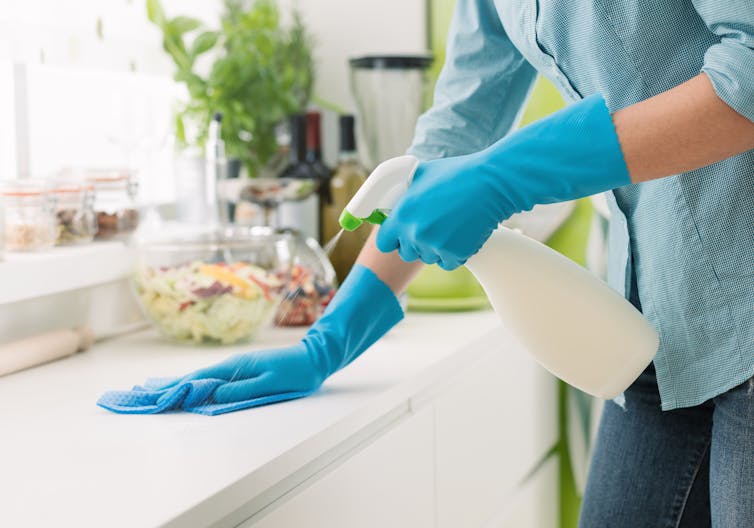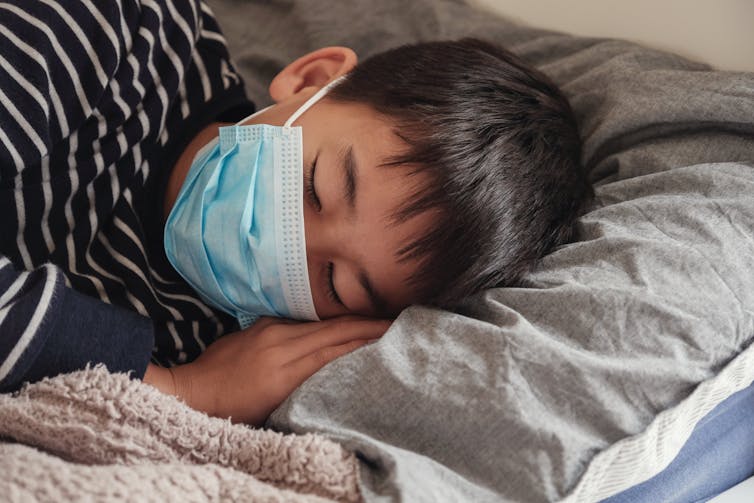Got someone with coronavirus at home? Here’s how to keep the rest of the household infection-free
Although some positive signs suggest Victoria's second wave may be slowing, we continue to see wide-ranging numbers game of COVID-19 cases recorded every day.
All but people WHO test positive for COVID-19 won't need hospital care and will self-isolate at home. But is it then inevitable the rest of the household will becharm it?
It shouldn't equal, if you follow a few important infection bar stairs.
Firstly, how does the virus spread?
We sympathize SARS-CoV-2, the coronavirus that causes COVID-19, spreads to others primarily in two ways:
- an uninfected person breathes in catching droplets released when an infected person breathes, talks, coughs or sneezes
- an antiseptic person touches a surface contaminated with these droplets and so touches their mouth, scent out, eyes or solid food. Viral particles can stay infectious on surfaces for extended periods.
In that respect's likewise mounting evidence SARS-CoV-2 can spread via the airborne route: smaller "aerosolised" particles that linger in the bare.
Surviving in closely quarters with someone with COVID-19 substance thinking almost slipway to foreclose to each one of these modes of transmission.
Closing off and ventilation
Ideally, the COVID-positive soul should have their own room and bathroom to minimise contact with others. If a dedicated room International Relations and Security Network't available, they should maintain as much distance as possible from other members of the household.
It's especially important for anyone in the household who is at higher risk of exposure — so much as elderly family members or hoi polloi with compromised unsusceptible systems — to keep their distance from the infected person.

Additionally, the improved the ventilation, the lower the gamble of transmission system. Weather permitting, open ai Windows to encourage air exchange.
It's also a goodness idea to keep the door to the infected soul's room blocked to minimise the movement of contaminated air into the rest of the theater.
Personal hygiene
Everyone in the menag — just the COVID-19 patient specially — should practise good respiratory hygienics (covering coughs and sneezes and disposing of used tissues).
Hand hygiene becomes even more important. Everyone in the household should wash their hands frequently, particularly before eating or after manipulation potentially dirty objects. Use soap and water for at least 20 seconds or a sanitiser with at least 60% alcohol.
The World Health System recommends the infected someone break a mask A much as possible to slim the number of infectious particles in the aviation and lower the risk of transmission.
Caregivers may too choose to get into a cloak when entry the infectious person's room. They should wear gloves if they're going to come into contact with body fluids such as vomit, faeces or saliva.
Every last mercury-contaminated wasteland — such Eastern Samoa used tissues, masks and gloves — should be put into a devoted bin. The ABA transit number should have a lid and be seamed. Wear gloves when evacuation the bin.
Sharing International Relations and Security Network't caring
To prevent likely disperse via contaminated objects, deflect sharing sheets, towels, toothbrushes, cups and glasses, eating utensils or equipment so much As mobile phones with a COVID-positive mortal.
If others need to use or wield utensils the COVID-positive person has used, wear gloves when treatment them, wash them with overheated water and detergent or put them through a hot cycles/second in the dishwasher. Objects you can't wash can be wiped Down with disinfectant.
Address used linen paper and clothing with kid gloves to avoid the possibility of shaking computer virus particles into the air travel. In hospital settings, nurses make beds without flapping the sheets around to minimise the transfer of pathogens.
Put used linen directly into the automatic washer and wash and dry it at the highest possible temperature mount. If you Don't have a apparel dryer, hang laundry in the sun. Bear witness suggests sunlight bathroom demobilize viruses.
Up your cleaning gage
You should clean surfaces much as benchtops and tables every day with hot soapy water system followed by a disinfectant.
Pay particular attention to cleaning often touched shared out surfaces, such equally door and cupboard handles, light switches, toilets, sinks and taps.
If the bathroom is shared, the COVID-constructive somebody should clean and disinfect the bathroom after using it if they'ray well enough to do sol. There is some evidence SARS-CoV-2 can be present in faecal matter.

Caring for someone with COVID-19
If you'atomic number 75 looking after a family member or housemate with COVID-19, see to it they have nutritive food to eat and fluids to drink. Staying substantially hydrated is important when a person has a fever, to replace fluids irrecoverable due to sweating.
People with a computer virus often feel fatigued as a result of their body's immune reaction, thus information technology's important they get plenty of rest.
While fever is nature's way of fighting off an infection — our immune cells work better when we have a fever — if needed, opposed-pyretic drugs so much As paracetamol can make the person more well-fixed.
It's important to monitor how the person is touch, and seek medical help if they deteriorate.
Eventually, members of the household should keep an eye verboten for and get tested if they develop any COVID-19 symptoms, much as cough Oregon fever.
This story was originally published on The Conversation by Professor, Nursing and Deputy Head (Learning &A; Teaching), School of Breast feeding and OB, Griffith University
https://hellocare.com.au/got-someone-coronavirus-home-heres-keep-rest-household-infection-free/
Source: https://hellocare.com.au/got-someone-coronavirus-home-heres-keep-rest-household-infection-free/
0 Response to "Got someone with coronavirus at home? Here’s how to keep the rest of the household infection-free"
Post a Comment